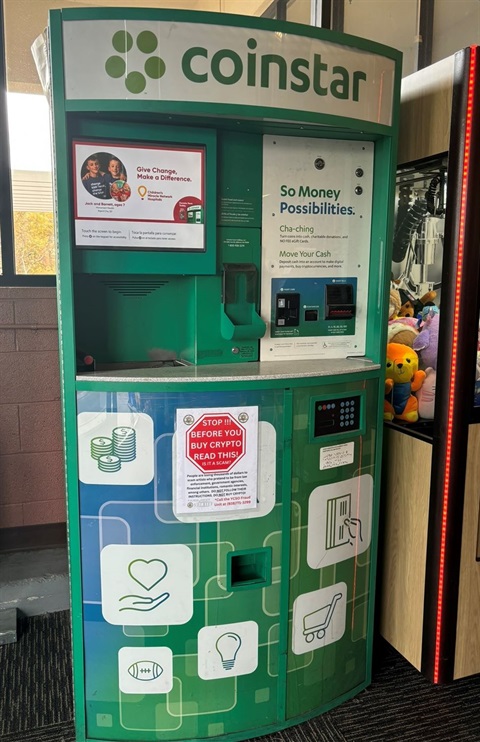YCSO AND ATTORNEY GENERAL'S OFFICE TEAM UP FOR CRYPTO MACHINE WARNINGS
Published on November 26, 2024

YCSO and the Arizona Attorney General's Office are partnering to hopefully save county residents from losing thousands of dollars at cryptocurrency machines in retail stores.
AG Kris Mayes issued a letter to the business community in support of the YCSO efforts, and local merchants have begun to fully embrace the idea of having the warning signs posted on Coinstar machines and Bitcoin ATMs around Yavapai County. The "STOP" signs urge anyone who is going to use the machine or ATM in response to a scam contact, to cease their purchase of Bitcoin or other types of cryptocurrency if they have been instructed to purchase it by someone they do not know and have never met in person. In recent months, county residents have been scammed out of hundreds of thousands of dollars by fraud artists who call, text, e-mail or contact their victims by social media. They demand payment for things like old fines, arrest warrants, relatives in some kind of legal or medical trouble, past due taxes, fixing supposed hacked financial accounts, or an online romantic interest who needs cash for some type of emergency or super investment opportunity.
The number of scams being run by these criminals continues to grow by the week, and they can also demand payment by wire transfer or gift cards. YCSO Fraud Investigator Ron Norfleet warns residents against answering these phone calls or clicking on any link in a text message or e-mail from people you do not know personally. He also says you should never allow the scammer to play on your emotions so that you make a quick and unwise decision to give out personal or financial information or pay thousands of dollars to the fraudster. Just hang up or delete, slow down, think about it, and talk to a trusted friend or relative, and always call the YCSO Fraud Unit at (928) 771-3299 to report the scam.
Also, around the holidays, scammers pretending to be from a charitable organization increase their activity, hoping to play on your sympathy and compassion for those in need. Norfleet says to hang up or delete, then call the real organization for yourself to see if the request is legitimate.
Don't forget, scammers can spoof real people or agencies or businesses on your caller ID (they have even used the Yavapai County Sheriff's Office on many occasions) and they can mimic the voice or pictures of almost anyone through Artificial Intelligence. The best way to protect yourself is to assume it's a scam, refuse to give out any information or carry on a conversation, hang up and then fully investigate the claims yourself (for example, call your bank, the law enforcement or US government agency, the relative in trouble, or whoever the scammer claimed to represent). You will be glad you did. And always spread the word to your family, friends, and neighbors about any potential scam activity, so they too can hold onto their money.